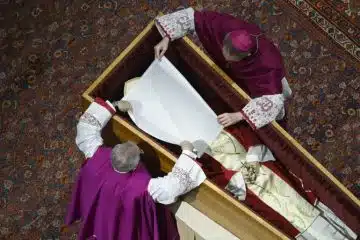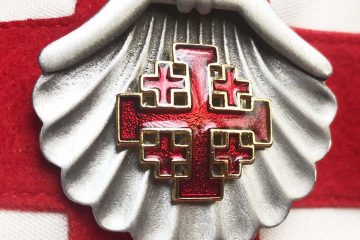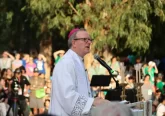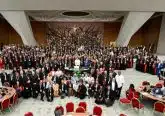Sts. Ignatius and Francis of Assisi, a bond highlighted by Pope Francis
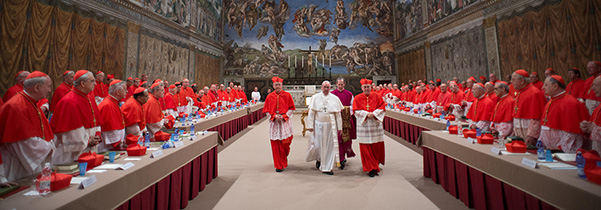
By Cindy Wooden Catholic News Service
VATICAN CITY (CNS) — Pope Francis is “a Jesuit’s Jesuit” who understands the importance of St. Francis of Assisi in the life of St. Ignatius of Loyola, founder of the Society of Jesus, said the Jesuits’ secretary for the promotion of the faith.
U.S. Jesuit Father Gerald Blaszczak told Catholic News Service March 15 that while most Jesuits were shocked that a Jesuit was elected pope, “any Jesuit worth his salt” would not be surprised that the pope took the name of St. Francis of Assisi.
Pope Francis, the former Cardinal Jorge Mario Bergoglio of Buenos Aires, Argentina, entered the Jesuit novitiate in 1958 and was ordained to the priesthood in 1969. He had been novice master and, from 1973 to 1979, was the Jesuit provincial for Argentina.
Father Blaszczak said Pope Francis’ training and priesthood as a Jesuit “tell you that he’s been steeped in Ignatian spirituality,” has had “a top-notch secular education” and that “his formation has always put him in touch with real people in real-life situations,” which he then has reflected upon in an effort to identify the ways God was present.
“That he chose the name Francis signals to us where he’s from, what he’s about and what he believes the reform of the church is going to require: It’s not going to require moral muscle, it’s not going to require just philosophical analysis; it’s going to require an engagement with the person of Christ,” particularly through the Scriptures, he said. “But it’s going to be the Christ poor and humble.”
While some people thought maybe Pope Francis took his name thinking also of the great Jesuit St. Francis Xavier, Father Blaszczak said Jesuits know just how important the life, example and spirituality of St. Francis of Assisi was in the conversion of their founder, St. Ignatius, and in the development of what has come to be known as Ignatian spirituality.
St. Ignatius, who lived 1491-1556, was from a Spanish noble family. After being wounded in battle, he began reviewing his life and thinking about his future. Father Blaszczak said he saw his choices as life and a career in the royal court or a life spent imitating St. Francis of Assisi.
“For Ignatius, Francis is the alternative to the life of the world. Francis, with his itinerant ministry and his intense devotion to the life of Christ and his ascetical lifestyle,” is the counterbalance to the worldly life in the court, the Jesuit said.
“Ignatius, as he admits himself, was given to womanizing, gambling and feats of arms,” but at the time of his conversion, “to his great surprise,” Ignatius finds himself “much more attracted, much more consoled, enlivened and given joy when he thinks about imitating the life of St. Francis,” the founder of the Franciscans, who died in 1226.
Father Blaszczak said Catholics already have a good hint of how Ignatian and Franciscan spirituality might impact the way Pope Francis exercises his ministry “in the way he engaged the people of Rome” when he first stepped out onto the balcony as their bishop and pope March 13 “with great simplicity, with minimal pomp and circumstance.”
The Jesuit said he expected Pope Francis to continue as much as possible to live as he did while cardinal and archbishop of Buenos Aires, with “simplicity and austerity in conformity with the life of Ignatius and Francis, in conformity with his intention to follow Christ poor and humble.”
The focus of St. Ignatius, St. Francis and “historically of our new pope” when he was bishop was to be closest to the poor and those on the margins of society, he said.
The modern papacy, however, has included a certain style dictated by protocol and respect for the pope.
Father Blaszczak said he did not think that would frustrate Pope Francis.
“From the conversations I’ve had with my Latin American Jesuit colleagues, this is a man who knows his own mind. This is a man who is not afraid of choosing and marking his own direction,” he said.
He also said he did not think the life of the Society of Jesus would change much with a Jesuit in the Apostolic Palace, because “we are bound to the service of the church through our connection and availability to the Holy Father, and that doesn’t change” no matter who is pope.
The Jesuits promise not to seek high offices in the church, which explains in part why there has never been a Jesuit pope before. However, Father Blaszczak said, that Jesuit promise is secondary to their promise to always be available for whatever mission the church needs them to take on.



